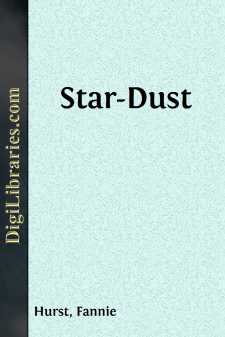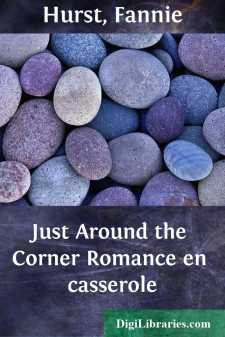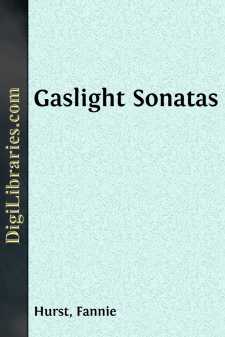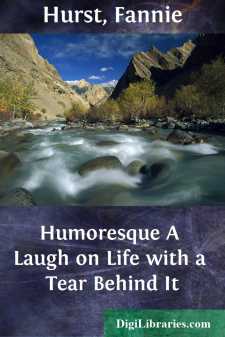Categories
- Antiques & Collectibles 13
- Architecture 36
- Art 48
- Bibles 22
- Biography & Autobiography 813
- Body, Mind & Spirit 142
- Business & Economics 28
- Children's Books 17
- Children's Fiction 14
- Computers 4
- Cooking 94
- Crafts & Hobbies 4
- Drama 346
- Education 46
- Family & Relationships 57
- Fiction 11829
- Games 19
- Gardening 17
- Health & Fitness 34
- History 1377
- House & Home 1
- Humor 147
- Juvenile Fiction 1873
- Juvenile Nonfiction 202
- Language Arts & Disciplines 88
- Law 16
- Literary Collections 686
- Literary Criticism 179
- Mathematics 13
- Medical 41
- Music 40
- Nature 179
- Non-Classifiable 1768
- Performing Arts 7
- Periodicals 1453
- Philosophy 64
- Photography 2
- Poetry 896
- Political Science 203
- Psychology 42
- Reference 154
- Religion 513
- Science 126
- Self-Help 84
- Social Science 81
- Sports & Recreation 34
- Study Aids 3
- Technology & Engineering 59
- Transportation 23
- Travel 463
- True Crime 29
Star-Dust
by: Fannie Hurst
Description:
Excerpt
CHAPTER I
When Lilly Becker eked out with one hand that most indomitable of pianoforte selections, Rubinstein's "Melody in F," her young mind had a habit of transcending itself into some such illusory realm as this: Springtime seen lacily through a phantasmagoria of song. A very floral sward. Fountains that tossed up coloratura bubbles of sheerest aria and a sort of Greek frieze of youth attitudinized toward herself.
This frieze was almost invariably composed of Estelle Foote, a successful rival in a class candidacy for the sponge-and-basin monitorship; Sydney Prothero, infallible of spitball aim; Miss Lare with her spectacles very low on her nose and a powdering of chalk dust down her black alpaca; Flora Kemble with infinitely fewer friendship bangles on her silver link bracelet; Roy Kemble, kissing her yellow, rather than yanking her brown, braids.
And then suddenly, apropos of nothing except the sweet ache of Lilly's little soul, the second movement would freeze itself into a proscenium arch of music, herself, like a stalagmite, its slim center.
At this point, "Melody in F" veils itself in a mist of arpeggios, and Mrs. Becker, who invariably, during the after-school practice hour, sat upstairs with Mrs. Kemble in her sunny second-story back, would call down through the purposely opened floor register.
"Lilly, not so fast on that part."
"Yes'm."
Were it not that the salient spots, the platform places in experience, are floored over in little more or less identical mosaics of all the commonplace day by days, Lilly Becker, at the rented-by-the-month piano in her parents' back parlor in Mrs. Schum's boarding house, her two chestnut braids rather precociously long and thick down her back, her mother rocking rhythmically overhead, were spurious to this narrative.
Yet how much more potently than by the mere exposition of it and because you have looked in on the nine-year-old chemistry of a vocal and blond dream in the dreaming, are you to know the Lilly of seventeen, who secretly and unsuccessfully washed her hair in a solution of peroxide, and at eighteen, through the patent device of a megaphone inserted through a plate-glass window, was singing to—But anon.
There was a game Lilly used to play on the front stairs of Mrs. Schum's boarding house, winter evenings after dinner. She and Lester Eli, who, at seventeen, was to drown in a pleasure canoe; Snow Horton—clandestinely present—daughter of a neighborhood dentist and forbidden to play with the "boarding-house children"; Flora and Roy Kemble, twins; and little Harry Calvert, who would creep up like a dirty little white mouse from the basement kitchen.
"C"—hissed sibilantly.
"Can't carry cranky cats!"
"No fair, Snow; that doesn't make sense."
"Does."
"Your turn, Roy."
"Z."
"No fair. Nothing begins with 'Z.'"
LILLY: "Does so. Z! Z—zounds—zippy—zingorella—zoe! Zoe!"
By similar strain of alliterative classification, Mrs. Schum's boarding house might have been indexed as Middle West, middle class, medium price, and meager of meal....






